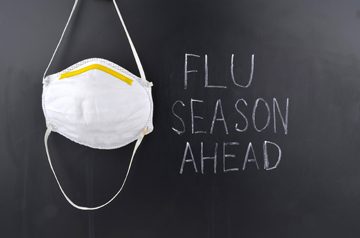
1. The flu shot won’t protect me 100% so why bother?
“When someone asks ‘why do I need the flu shot’? I say that the shot isn’t just for them; it’s also for the people in their life who could get really sick if they got the flu,” says Dr. Jonathan Kerr, a family physician from Belleville, Ont. Seniors, young children, pregnant women, or individuals with chronic (asthma, diabetes, heart disease), or immune compromised (cancer, AIDS, recent organ transplants) conditions are most at risk for influenza-related complications such as pneumonia, bronchitis and even death. When you get a flu shot, not only will you increase your chances of avoiding the illness and its complications, but theirs as well.
While it’s true that the flu shot isn’t 100 percent effective, Kerr says that’s not a good enough reason to skip it. “The flu shot isn’t perfect and won’t prevent the flu in every case. This year it’s about 40 percent effective. That’s better than zero percent, so it’s still worthwhile getting a flu shot. It’s a misconception that influenza is a minor illness. It’s very serious,” says Dr. Kerr. [*Update: A new report from the U.S. Centers for Disease Control and Prevention (CDC) suggests that this year’s flu shot may actually be 23 percent effective.]

2. The shot can give you influenza
If you become ill after receiving the flu shot, the immunization isn’t to blame. “After getting an immunization, your body mounts a mini immune response to create the antibodies that you need [to provide protection against the flu],” says Dr. Kerr. “Some people might feel a little sick a day after the shot because their body’s mimicking fighting an infection, but they don’t actually have the flu.” If you have a prolonged bout of coughing or a stuffy nose, a cold virus is usually the culprit. “Some people are sick with a cold around the time that they get a flu shot and think it was caused by the shot, but that’s not the case,” he says.

3. Seasonal influenza and ‘stomach flu’ are the same thing
Many people confuse these two sicknesses, but they’re different ailments. The influenza strains that circulate every winter affect only the respiratory system (the lungs, nose and throat), causing nasal congestion, sore throat, headache, coughing, a high fever, body aches, and extreme fatigue. Seasonal influenza doesn’t spark diarrhea or abdominal distress. These two symptoms are hallmarks of viral gastroenteritis, an illness that’s often called ‘stomach flu.’ Gastroenteritis doesn’t touch the respiratory system. Instead it targets the intestines and unleashes watery diarrhea, vomiting, stomach cramps, a low-grade fever and headache.

4. I currently have a cold so I can’t get a flu shot
You can still get a flu shot even while you’re under the weather with a cold. “If you have a cold, your body is already mounting an immune response so it’s a good time to get the flu vaccine because your body is already in antibody production mode,” says Dr. Kerr. This revved up production of antibodies will help your body expedite its protection against the influenza virus.

5. I’ve had the flu this season so I’m now immune
Multiple influenza strains circulate during flu season. Recovering from one particular strain doesn’t make you immune to other active strains. And if the virus that made you ill mutates, you could become sick again if you’re exposed to it. “Even if you think you’ve had the flu, still get the flu shot,” says Dr. Kerr. It’s also common for people to mistake a bad cold, or a bout of gastroenteritis for the flu, so skipping the shot on the heels of one of these illnesses isn’t recommended. It’s worth noting that the only way to confirm that you have influenza is to undergo a throat swab in a doctor’s office or emergency room. If the test comes back positive from the lab, you’ll have a definitive answer.

6. Flu shots are only available from my doctor and I don’t have time to book an appointment
It’s never been easier to get a flu shot. “You don’t need to see your doctor to get the flu shot. There are many different options that can fit any schedule,” says Dr. Kerr. You can roll up your sleeve at many pharmacies across the country, or at flu shot clinics held by public health units in malls and community centres. Many workplaces now offer influenza immunization days, too.

7. If I get the flu, I’ll take antibiotics to cure it
Seasonal influenza cannot be treated or cured with antibiotic medications. “Antibiotics target bacteria only. Because the influenza illness is from a virus [and not bacteria], antibiotics don’t work,” says Dr. Kerr. Doctors occasionally prescribe antiviral medications such as Tamiflu to help reduce influenza symptoms, but these drugs must be taken in the first few days of the flu, otherwise they don’t offer much symptom relief. “If you think you have influenza-type symptoms it’s best to get seen by your doctor early so we can give you this antiviral medication,” he says.
